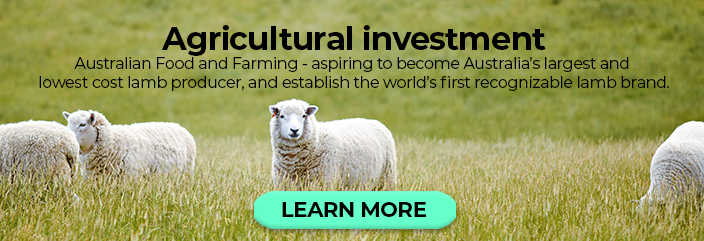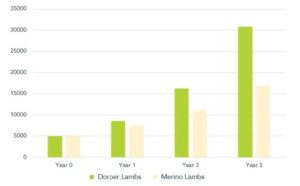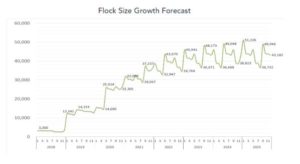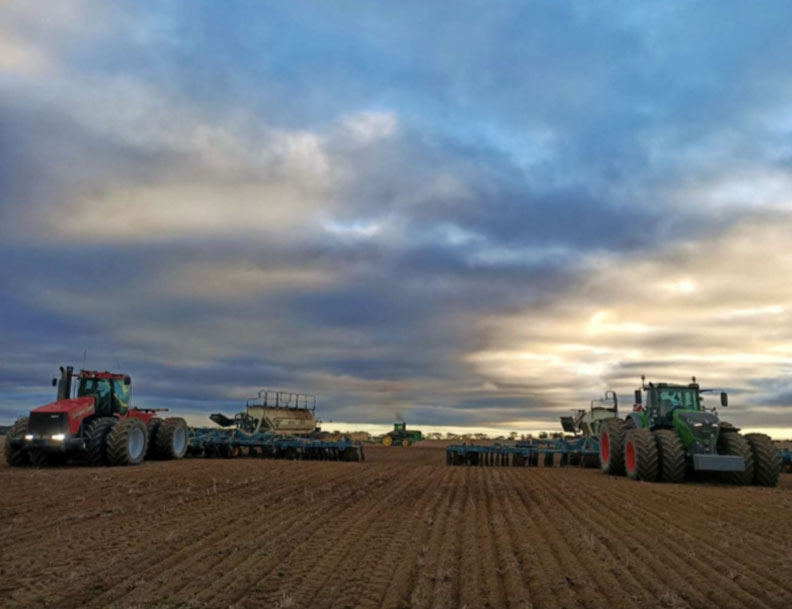“Green and clean” – Regenerative farming for healthy soil and fat sheep
Australia remains a world-class location for agricultural production due to the relatively low cost of land and natural grazing systems. Australian produced meat and crops are considered “clean and green” with high quality of food quality, animal health and bio-security.
In 2017, Australia and New Zealand produced 90% of world sheep meat exports, with the OECD-FAO projecting a further 26% rise by 2027.
Australian Food & Farming (AFF) is well-positioned to capitalise on Australia’s superior meat production reputation and infrastructure through their rapidly expanding Dorper Lamb flock, as well as their efficient regenerative farming methods.
Regenerative farming: A sustainable approach for healthier pastures and greater yields on undervalued land
At their farms in NSW and Western Australia, AFF has employed a series of drought protection measures as the backbone of their efforts to becoming Australia’s leading producer of quality sheep meat.
Their vision is to create biodiverse landscapes, biologically enriched soil, and healthy food through an ecological and ethical approach. Using the concept of regenerative farming processes, which involves reducing the use of chemical fertilisers, pesticides, and herbicides, as well as implementing carefully managed pasture grazing programs, AFF is able to strengthen soil health.
Healthy soil is essential, not only from a sustainability perspective, but also from a production perspective. It makes the land less volatile to weather and increases the nutritional value in the produce.
With regenerative farming, AFF can maintain their green pastures even on undervalued farmland, and feed their Dorper Lambs high-quality, sustainable and healthy grass.
Their Marabou property in Tocumwal is one such example. A purpose-built 1,539 hectares farm in New South Wales mostly used for cropping in the past, AFF now use the land for grazing. AFF’s regenerative farming has improved the farmland and helped it recover faster after droughts and create healthier grass for grazing.
Through their farming practices and strategic choice of locations between the east and west coasts, AFF has access to green pastures year-round for their rapidly expanding flock of Dorper breeding ewes.
 The benefits of Dorper Lamb
The benefits of Dorper Lamb
Dorpers are highly adaptable and easy to maintain compared to other breeds. They start grazing in the first few days after birth and can adapt to most grazing conditions, which can help convert poor quality pastures into profit.
Dorper lambs is also a fast growing breed, responding well to nutrition, and gaining weight quickly. With no defined breeding season, Dorpers are fertile year-round which results in more rapid flock growth. AFF’s flock can produce lamb every eight months due to the Dorpers’ particularly high reproduction and twinning rates.
Below is a comparison between flock growth for Merino Lambs and Dorper Lambs respectively, clearly showing the advantage of breeding Dorper Lambs for flock growth.

AFF on track to becoming Australia’s largest and lowest cost lamb producer
AFF ranks as one of the larger sheepmeat producers in Australia – a critical factor for bringing down costs and being competitive in the market. The costs of production for the smallest producers are almost 30% higher than the costs of production of the largest producers. AFF intends to further increase scale to become more efficient and drive down its costs.
By the end of next year, AFF are targeting a breeding flock of 20,000 head as they build scale through natural growth and purchases.

AFF currently has 3 sites in Western Australian, all within 200km of each other, as well as a fattening base in Tocumwal, New South Wales. They’re continuously purchasing more land to expand. Their latest acquisition was Minni Downs and Rockwater in Varley, Western Australia, which brought their total owned land up to 16,000ha including 4000ha of leased farm land.
With their recent purchases, regenerative farming methods and natural growth of Dorper flock, AFFis well on track towards their larger goals of becoming Australia’s largest and lowest cost lambproducer.
Investors interested in finding out more about Australian Food & Farming, and how to get involved, by visiting their Investor Centre.
*Reach Markets are the advisors assisting with the management of this offer and may receive fees depending on whether an offer is taken up by investors.
General Advice Warning
Any advice provided by Reach Markets including on its website and by its representatives is general advice only and does not consider your objectives, financial situation or needs, and you should consider whether it’s appropriate for you. This might mean that you need to seek personal advice from a representative authorised to provide personal advice. If you are thinking about acquiring a financial product, you should consider our Financial Services Guide (FSG) including the Privacy Statement and any relevant Product Disclosure Statement or Prospectus (if one is available) to understand the features, risks and returns associated with the investment.
Please click here to read our full warning.



